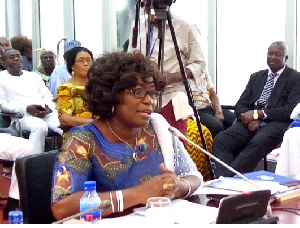Mrs Elizabeth Naa Afoley Quaye, Minister of Fisheries and Aquaculture Development, has said government is determined to end all forms of Illegal, Unreported and Unregulated (IUU) fishing practices that has become so rampant in the fishing sector.
She told a durbar of chiefs, fishermen, and fishmongers at Elmina in the Central Region that the fight against illegal fishing was not only limited to light fishing but also against foreign trawlers that engage in ‘Saiko’ fishing as well as those operating without regard to the fishing regulations of the country.
‘Saiko’ is an illegal system where foreign trawlers stay on the sea for longer periods doing licensed fishing but catch unauthorised fishes and sell them as by-catch to members of the By-Catch Collectors Association on the high seas.
This practice, according to the fisher folks, prevents their normal fishes to swim to their catchment areas and so when they go to sea, they do not get the usual catches.
Mrs Quaye said the Ministry had received funds from the Ministry of Finance to buy two patrol boats to help augment the usage of drones to monitor the seas, to help prevent people from practicing IUU fishing.
“We want to intensify our patrols and that’s why we are going to get our patrol boats by October,” she said.
The stakeholders meeting was organised as part of a USAID/ University of Cape Coast (UCC) Fisheries and Coastal Management Capacity Building project being implemented by the Department of Fisheries and Aquatic Sciences and the Centre for Coastal Management (CCM) of the UCC.
The Fisheries Minister commended the UCC for leading the campaign to help regulate the fishing sector through the engagement of fisher folks in different fora that goes a long way to complement government’s efforts.
Mrs Quaye said a fine close to two million Ghana Cedis are also being placed on vessels operating without licenses, disregarding the laws of fishing to deter people from doing illegal fishing.
She said many fishing vessels plying the shores of Ghana do not have the requisite licenses and some vessel operators have refused to renew their licenses while others had also contravened with the laws of Ghana.
Mrs Quaye said the licenses of such people would be redrawn by the end of September.
She said some of the captains of the vessel have been found not able to speak the English language or any other Ghanaian languages and that was against the laws of Ghana, which warrant the seizures of their licenses.
The Ministry, together with the taskforce had inspected about 50 fishing vessels operating in the country and more than 40 of the vessels had issues that contravened the laws on fishing.
Mrs Quaye said the Attorney-General would assess the report on the vessels and give the go ahead to seize the licenses of the culprits.
Professor Denis Aheto, Director of the CCM of the UCC and Project Manager of the USAID Programme, said the interaction was part of efforts by the University to blend scientific knowledge with traditional knowledge to help improve fishing in the country.
Nana Kodwo Condua VI, Omanhene of Edina Traditional Area, expressed his readiness to support government’s efforts at sanitising the fishing sector.
General News of Friday, 8 September 2017
Source: ghananewsagency.org

















